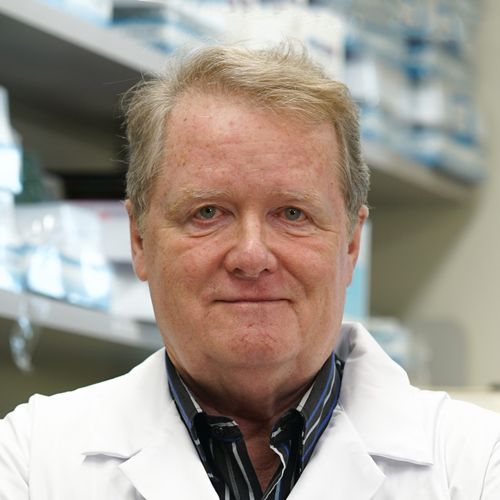Biography
Dr. Higgins joined the Faculty of Roswell Park Comprehensive Cancer Center (Roswell Park) in 2001, and in 2009 was promoted to Associate Professor of Oncology and Associate Member in the Department of Molecular and Cellular Biology. He holds a joint appointment as a Research Associate Professor at the State University of New York at Buffalo.
Before joining the faculty at Roswell Park, Dr. Higgins was a Research Associate in the Department of Human Genetics at Roswell Park where he was involved in the physical mapping of several human genetic diseases including the cancer predisposition condition Beckwith-Wiedemann syndrome (BWS). He was among the first investigators to demonstrate that an alteration in DNA methylation (epimutation) at an imprinting control region could give rise to a human disorder. Dr. Higgins has authors more than 70 peer-reviewed journal articles.
Positions
Roswell Park Comprehensive Cancer Center
- Emeritus Faculty
- Department of Molecular and Cellular Biology
Background
Education and Training
- PhD - Biology, Queen’s University, Kingston, Ontario
Professional Memberships
- American Association for the Advancement of Science
- American Association for Cancer Research
Research Overview
Over the past 5 years, working together with Dr. Ambrosone and other colleagues in the Department of Cancer Prevention and Control, Dr. Higgins’ lab has been involved in the genome-wide methylation analysis of breast cancers using the Illumina Methylation 450K and EPIC platforms to identify potential mechanisms for the increased aggressiveness of this disease in African American women. Currently, his lab is investigating the potential of various reproductive factors such as parity and breastfeeding to predispose women to more aggressive breast cancer by altering DNA methylation and differentiation of mammary gland epithelium.
A second project in Dr. Higgins’ lab is the development of small molecule inhibitors against the RNA-processing protein Lin28B. Aberrant expression if LIN28B blocks the maturation of a group of tumor suppressive miRNAs, the let-7 family. Expression of LIN28B and suppression of let-7 miRNAs have been shown to be critical in the development of several adult and pediatric malignancies. Dr. Higgins’ lab has developed a cell based reporter system to screen small molecule libraries for compounds that inhibit the LIN28/let-7 miRNA oncogenic axis and are currently following up on several lead compounds. The reporter system is also being used to identify additional protein components of this oncogenic pathway in order to identify additional potential therapeutic targets.
Publications
Key Publications
- Ambrosone, C.B., Young, A.C., Sucheston, L.E., Wang, D., Yan, L., Liu, S., Tang, L., Hu, Q., Freudenheim, J.L., Shields, P.G., Morrison, C.D., Demissie, K., & Higgins, M.J. (2014). Genome-wide methylation patterns provide insight into differences in breast tumor biology between American women of African and European ancestry. Oncotarget, 5(1), 237-248. PMCID: PMC3960204
- Wang, D., Yan, L., Hu, Q., Sucheston, L.E., & Higgins, M.J., Ambrosone, C.B., Johnson, C.S., Smiraglia, D.J., Liu, S. (2012). Ima: An R package for high-throughput analysis of Illumina's 450k Infinium Methylation Data. Bioinformatics, 28(5), 729-730. PMCID: PMC3289916.
- Shin, J-Y., Fitzpatrick, G.V., & Higgins, M.J. (2008). Two distinct mechanisms of silencing by the KvDMR1 imprinting control region. EMBO Journal, 27(1), 168-178. PMCID: PMC2206141
- Fitzpatrick, G.C, Soloway, P.D.,& Higgins, M.J. (2002). Regional loss of imprinting and growth deficiency in mice with a targeted deletion of KvDMR1. Nature Genetics, 32, 426-431
